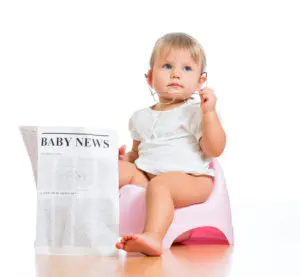 Make Potty Training Fun (and Fast) with These 5 Tips
Make Potty Training Fun (and Fast) with These 5 Tips
Potty training your child might seem like a daunting task, but obviously, it is worth the work. Some kids are ready to go at only 18 months old, but others won’t be potty-ready until they’re nearly 4 years old! No matter how old your child is when it’s time to potty train, you can help ease the transition to greater independence with these 5 suggestions.
1) Make a Formal Introduction
It’s a good idea to put some effort into introducing your child to the potty itself around her first birthday. Talk to her about using the bathroom when you have to go by using phrases
such as “Mommy’s going to go to the bathroom now” or “It’s potty time for daddy.” Try reading your child some fun children’s books about potty time. It may even help to ask, after
potty-themed story time, if your kid’s favorite stuffed animal or toy “has to go.” That way, she’ll get used to the idea of talking about it and accepting that potty time is a necessity for
everyone.
2) Look for the Right Time
Gestures and subtle clues from your child could indicate that he’s intrigued by the idea of the potty. If your kid has started investigating the bathroom or asks where you’re going when
you’re headed to the bathroom, then take that opportunity to stop and talk to your child about potty time. That said, there are better and worse times to actually start potty training. Try to
avoid starting potty training for a month after a major change such as a move, the addition of a new brother or sister, or an adjustment to your child’s sleep schedule. The less stress
associated with potty training, the better!
3) Find the Right Seat
After your child is comfortable with the idea of potty time, the next step is to make sure you’ve got the right potty-training seat in your house. Don’t be discouraged if you have to
try a few options before you find the right one—you’ve got plenty of options. You can find seats to place on top of your existing toilet seat, or you might prefer to have a separate mini-
toilet in the bathroom for your child. Once you’ve got a potty-training seat, be sure to let your child know that it’s hers. See if she’d like to try sitting on it—or if her favorite stuffed
animal would like to!
4) Praise and Reward
When your child starts using the potty on his own, you’ll want to encourage him by giving him praise for each successful trip. Keep your rewards simple—verbal praise goes a long way, and so does a sticker system. After ten successful toilet trips, you can offer your kiddo a special treat, such as a trip to the park or extra story time. Don’t forget that accidents will happen. Punishment shouldn’t be part of potty training. When your child has an accident, first help him get cleaned up. Remain calm, then after he’s in a fresh change of clothes and has calmed down, ask if something kept him from getting to the potty on time. Let him know that it’s important for him to use the potty and that he can always ask you for help in getting to the potty on time.
5) Make Personal Hygiene Fun
There’s no reason to avoid handwashing if it’s fun! You want your child to spend at least 20–30 seconds at a time washing her hands, including washing with soap up to the wrists.
If you have questions or need to speak to somoeone about potty training, just let one of our staff members know. We would love to help develop a plan with you.
